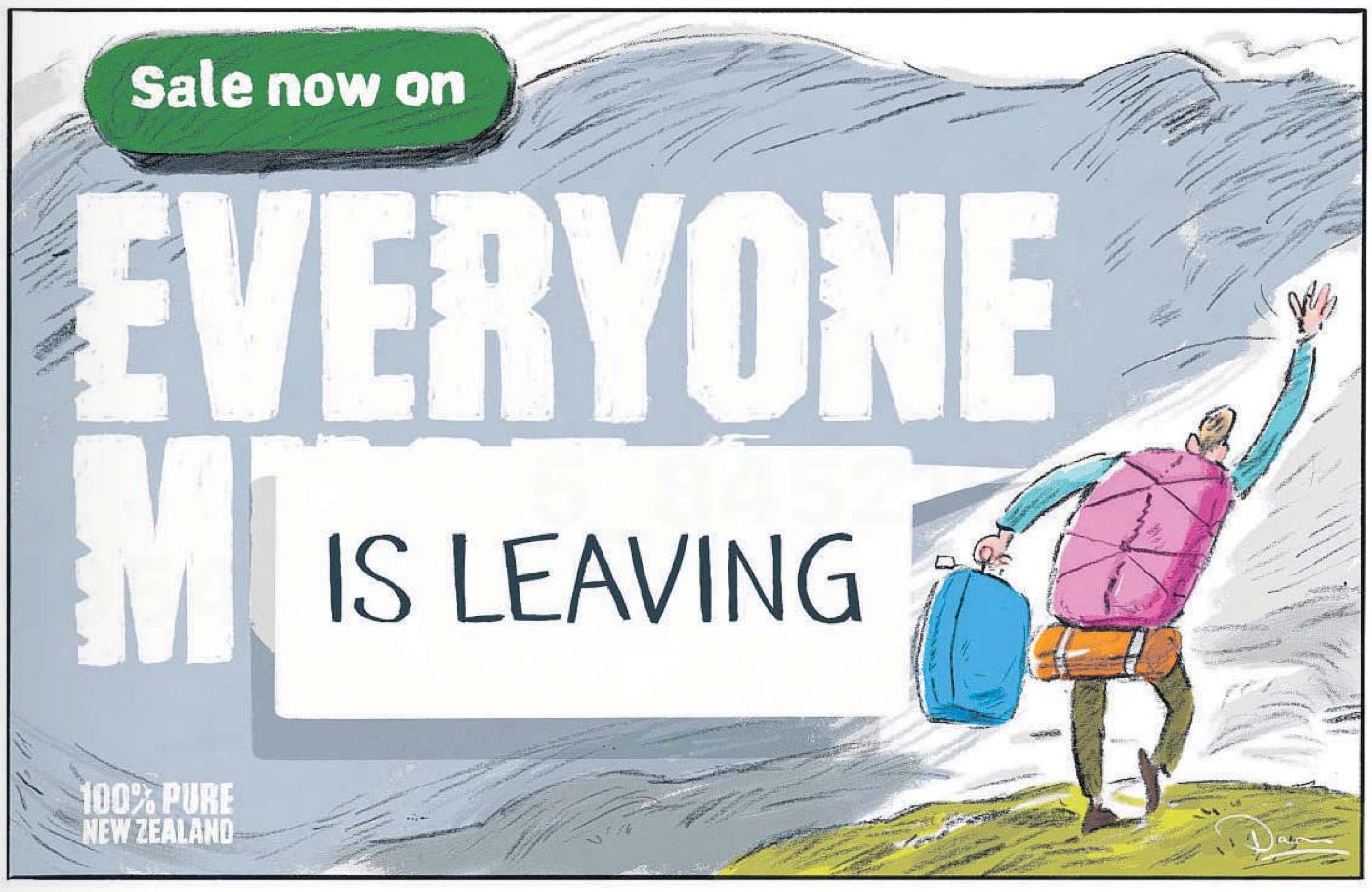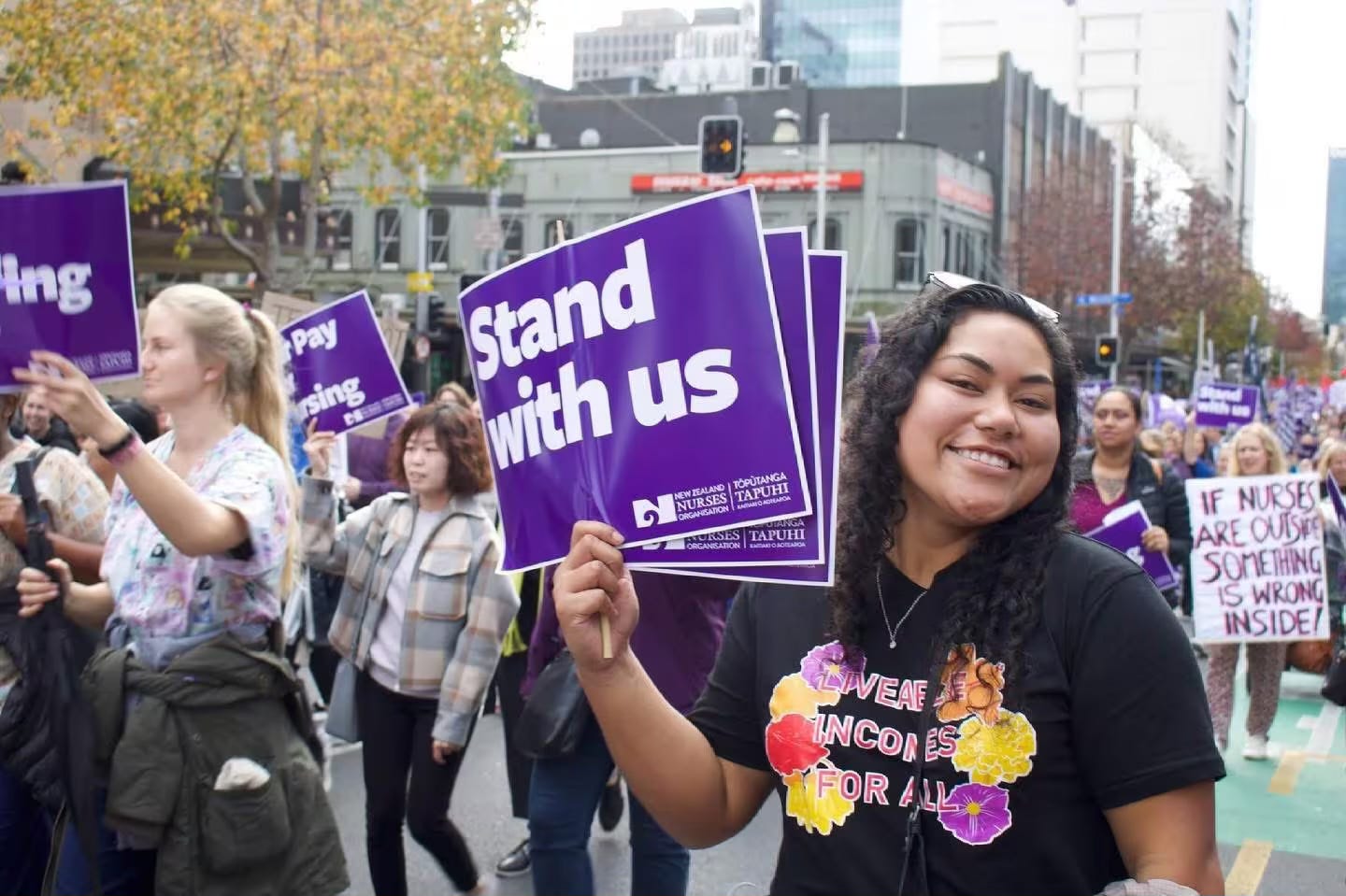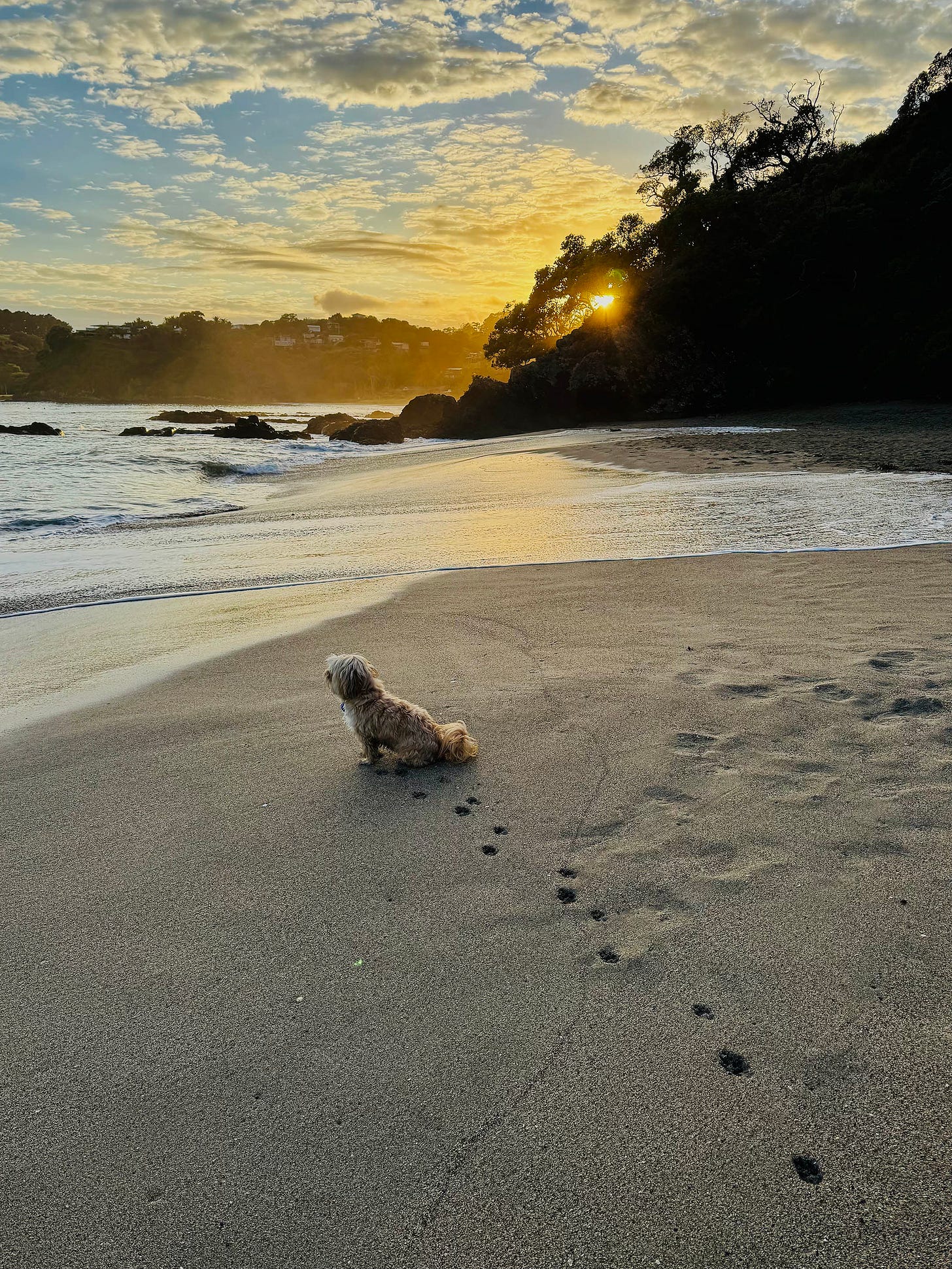After seeing yet-more-months of political debate and policy decisions to ‘go for growth’ by pulling the same old cheap migration and cheap tourism levers without nearly-enough infrastructure, or any attempt to address the same old lack of globally conventional tax incentives for investment, I thought it would be worth issuing a challenge to the opponents of tax reform in the form of an open letter, which can be read, listened to and shared publicly because I’ve taken the paywall off this one immediately.
‘Dear New Zealanders, your victory is pyrrhic’
Dear home-owning older voter,
You have successfully blocked the taxation of capital gains on leveraged residential land values for nearly 15 years and now both major political parties are so afraid of you doing it again they won’t even talk about changing the core nature of our political economy, which is now a broken, unhealthy, expensive housing market with starved public services and a stagnant real economy tacked on.
So now…
What.
Is.
The.
Point.
What's the point of 'winning' and keeping those capital gains if your kids have to migrate to be able to afford a family, and will raise your grandkids there, rather than here?
What’s the point of living in a million dollar asset with maybe a few others rented out or just sitting empty elsewhere if it means you only get to see your grandkids a few times a year?
What’s the point of feeling rich and believing everyone can (or should) get on the ladder under your own steam like you did, when we all know we’re way past that point, and your kids know it because they often have to ask for help with house deposits, loan repayments and free rent?
What’s the point of pretending that this ‘housing-market-with-bits-tacked-on’ way of running our economy and society works for everyone and can be sustained with economic growth if it means most of the kids you see on the streets are living here in poverty because:
their parents can barely afford the rent you charge them and can’t afford to leave; or,
they’re still living here because their parents are waiting for residency so they can get in to Australia through the back door; or,
they’re living here because their parents prefer to live in a New Zealand-style of poverty, rather than the one they grew up in India, the Philippines or China, without the nice views, the free(ish) healthcare and education systems and the NZ Superannuation for everyone at 65?
What’s the point of raking over the same old stale arguments about everyone-being-able-to-get-on-the-ladder-if-only-they-just-tried-a-bit-harder when the economic and social results of the last 30 years have shown it just does not work?
Who do you think you are still kidding?
Who do you think still believes this situation is sustainable?
The economy?
We’re now into a third year of a per-capita GDP recession because we:
haven’t invested enough in infrastructure for transport, housing, water, health and education to cope with the last decade’s strong population growth, which we decided we needed to keep the seams from bursting and the wheels of GDP rolling (because we know they’re so rickety they may be hard to start rolling again if they stop);
have decided (again) that starving public infrastructure of investment and staff is the best way to keep public debt and deficits low enough to afford more income tax cuts, which are needed to grow the disposable income so crucial for the banks’ lenders when they make decisions about how much leverage to pump into limited amounts of residential zoned land; and,
have chosen to replace locally-trained expensive workers with migrants with temporary visas, who we don’t need to train, keep healthy, educate or pay well, and we can exploit to lower our costs and avoid investing in our businesses.
The rest of us?
You’re not even kidding your own kids any more. They are voting with their feet at a rate of 200 a day, mostly to Australia, which does:
invest in infrastructure;
has kept strong unions and protects higher wages with legislation;
grew its productivity and those wages by forcing its workers to save and invest; and
is now encouraging and helping its local state governments to invest.
Or just yourselves?
Do you still believe it’s working for you and the rest of us in the long run?
If you say you do, then ask yourself one question in this poll
If you find yourself answering ‘yes, they left me here’, then you know what to do.
So what should those home-owners left behind do?
Vote for a party advocating some form of capital gains or wealth tax and some sort of incentive to save and invest in real businesses. Vote for a party that doesn’t believe in magical thinking and doesn’t tell you this current model will work, if only we:
cut taxes more;
cut public debt more by cutting public services via hospitals and schools and transport;
bring in more low-wage migrants to bid up rents and push down wages; and,
keep starving public investment in water, transport and housing networks to keep the debt low and to avoid flooding the unaffordable market for land with new supply.
Meanwhile, today’s six things in brief
Long stories short, the top six things in Aotearoa’s political economy around housing, climate and poverty on Wednesday, February 19 are:
Today’s must-read is a first-person Op-Ed in the NZ Herald-$$$ from Sarah Elisaia, who qualified as a registered nurse in 2020 and now works in Australia (see more detail below and unpaywalled link here at NZNO.org);
This electricity market Op-ed by Simon Bridges: ‘Unlock energy to unlock growth’ in NZ Herald-$$$ is interesting, given he says the Government should look at structurally separating the generator-retailers;
The details in the scoop below about doctors turning away fat people to avoid putting them on waiting lists is an indicator of what happens when you set targets for numbers or people on waiting lists and time spent waiting;
Tony Alexander’s survey of mortgage brokers published yesterday found that: “A strong net 54% of brokers have reported that banks are becoming more willing to advance funds,” and: “Investors getting ready to jump.”
Chris Hipkins has suggested for the first time he could work with Winston Peters in a coalition, which would rule out a capital gains tax for another decade;
There’s good news from Fonterra, which wants to pay its farmers extra to reduce their climate emissions.
(Usually, there is more detail, analysis and links to documents below the paywall fold and in the podcast above for paying subscribers. Normally, if we get over 100 likes from paying subscribers we’ll open it up for public reading, listening and sharing. I’ve taken an executive decision to open this up from start due to the public interest involved.)
Today’s must-read: Sarah’s plea from Australia
Here’s the detail in Sarah’s Op-Ed mentioned above and published in full here via NZNO.org (bolding mine);
After four years of study and 1100 clinical hours of unpaid placements, I began work as a registered nurse in February 2020. I was thrown into the deep end and braved the first year of my career through a global pandemic, serving my community and being labelled a “healthcare hero”.
Over the next three years, I saw up close the underfunding, undervaluing and the neglect of patients’ rights imposed by successive governments on the healthcare system.
For all the talk of heroes, our pleas for what seemed like bare-minimum resourcing constantly fell on deaf ears. I clocked out of most shifts exhausted, feeling guilt and anxiety for my patients.
The extreme budget cuts made by the coalition are the most recent acute flare of this chronic illness in the system.
Everything is on the chopping block. In 2022, the Association of Salaried Medical Specialists reported we needed 12,000 extra nurses to keep pace with Australia.
Yet at the heart of the present cuts is the claim that New Zealand has 3000 more nurses than it can afford in the budget. When asked if we need those 3000 nurses for the system to function properly, Health Commissioner Lester Levy couldn’t answer.
The answer is yes, those nurses and resources are desperately needed and people will die without them.
However, the prevailing logic of this Government is that the budget can somehow be detached from the resources needed to keep people alive and healthy. You can’t help but suspect it is setting the system up to fail on purpose.
Accompanying me at the strike was my 2-year old niece. I took photos of her carefully wrapping her tiny hands around a “safe staffing now” sign the same size as her.
In that moment I was overwhelmed with how each day was a missed opportunity to watch my niece grow and become her own person.
I spent each day of my trip home soaking up the joy of being around my favourite people in the entire world. I wasn’t prepared for how much grief and heartache was waiting for me once I returned to video calls instead of cuddles.
Back here in Australia, I’m constantly reminded that New Zealand nurses are internationally renowned and sought after for their dedication, skill and attitude. We’re trained to a high standard in our home country and then forced abroad to try to make a life and pay our bills.
I do wonder how many of us are yearning for home the way I am. If our Government treated nurses with respect by way of safe staffing, pay equity and workforce empowerment, how many of us would be booking the next flight home? How many families would be able to forge memories together instead of via FaceTime and WhatsApp?
It is both a great blessing and burden to be responsible for the lives and wellbeing of others. There are countless other career paths that are easier emotionally, spiritually, physically and financially.
Yet as a nurse, I feel it is our responsibility to believe in better for all of us, and that means to debunk the lie that we can’t fund the health system adequately. New Zealand has accepted this lie for years and the truth is a measly three-hour flight away.
As business oriented as healthcare is becoming, the greatest cost on a balance sheet will always be someone’s life.
Act Party minister Brooke van Velden boldly put on record that when it came to government spending on Covid, “We completely blew out what the value of a life was” – insinuating there is money to save in lieu. It is ideology like this that is sending hordes of our young workers abroad and driving this acute phase of illness that threatens the entire nursing profession in New Zealand.
Nurses are trained and experienced in recognising a deteriorating patient. As a society, we’d be wise to start observing signs of deterioration too. What are the nurses saying? Sarah Elisaia
Further reading elsewhere
Scoop: GPs say Wellington Hospital rejecting patients based on BMI. Health NZ denies patients are being rejected solely on BMI, despite letters that list the blunt tool as the reason - with GPs fearing it’s a tactic to manage waiting lists. The Post-$$$’s Rachel Thomas
Climate news: ‘No cavalry coming’: The Auckland town facing relocation due to flood risk NZ Herald’s Bernard Orsman
Health deep-dive: Going private: Is it the answer to public health woes? RNZ’s Ruth Hill
Housing news: Social housing residents plead for stability in quake-prone complex RNZ’s Kate Green
Health news: Struggling Christchurch ED asks patients go elsewhere unless it's 'life-threatening'
Good news: Thousands of farmers to earn cash for their climate efforts RNZ’s Eloise Gibson
Good news: Extra payments for farmers who pursue lower carbon footprints. Both Fonterra and its largest customers, Mars and Nestlé, dangle extra payments for farmers to lower emissions and meet the latter companies’ stringent emissions targets. The Post-$$$’s Dita De Boni
Politics news: Hipkins keeps alive possibility of working with NZ First The Post-$$$’ Thomas Manch
Scoop: Money-laundering rule changes could land NZ on undesirable grey list NZ Herald-$$$ Matt Nippert
Migration exploitation news: Salon ordered to pay $230k to seven former migrant workers. One former employee ‒ a woman from Vietnam with limited English ‒ was paid $200 in cash for working 10-hour days, six days a week. She and the others were all sacked without justification by the owner of Amy’s Hair and Nail Design. The Post-$$$’s Hanna McCallum
Op-Ed Golden visa? More like lead balloon By Brent Burmester in Newsroom
Politics news Healthcare now Kiwi's second-biggest concern RNZ
Health news: Thousands fewer getting mental health care, new data shows RNZ
Health news: ‘Severe harm’: Doctors blast ‘inhumane’ funding squeeze for disability sector NZ Herald
Health analaysis: When overlaying fact in health systems with fiction morphs into embellishment Blog post by Ian Powell
Budget cuts: Dismayed by funding cuts to fight truancy ODT-$$$’s Mark John
Substack essential
Chart of the day:
Cartoon of the day: ‘Everyone must go.’ ‘Ok. Bye.’

Timeline-cleansing nature pic of the day
Kā kite ano
Bernard















Share this post